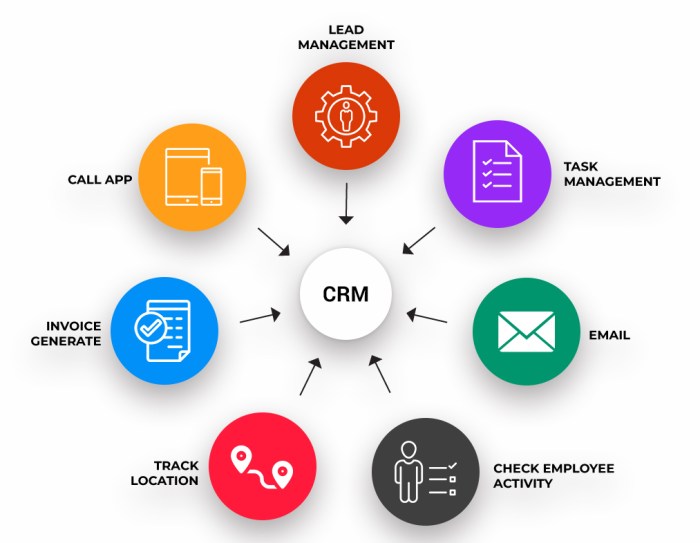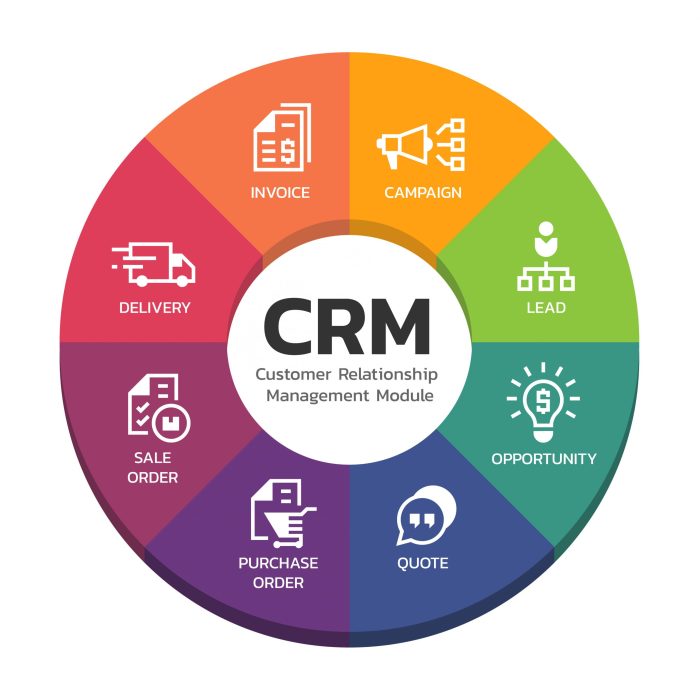Introduction to CRM Systems
In today’s competitive business landscape, understanding and nurturing customer relationships is paramount to success. This is where Customer Relationship Management (CRM) systems come into play. CRM systems are software applications designed to manage and streamline all aspects of customer interactions, from initial contact to ongoing engagement.
Defining CRM Systems and Their Purpose
CRM systems act as centralized hubs for storing and managing customer data, including contact information, purchase history, communication logs, and preferences. By consolidating this information, businesses gain a comprehensive view of their customers, enabling them to personalize interactions, anticipate needs, and deliver exceptional experiences.
Evolution of CRM Systems and Modern Applications
The concept of CRM has evolved significantly over the years. Early CRM systems focused primarily on automating tasks such as managing leads and tracking sales opportunities. However, modern CRM systems are far more sophisticated, incorporating advanced functionalities like marketing automation, social media integration, and artificial intelligence (AI).
Key Benefits of Implementing a CRM System
- Enhanced Customer Relationships:CRM systems empower businesses to understand their customers better, leading to more personalized interactions and improved customer satisfaction.
- Increased Sales and Revenue:By providing sales teams with valuable insights into customer behavior and preferences, CRM systems can boost sales conversion rates and drive revenue growth.
- Improved Marketing Effectiveness:CRM systems enable targeted marketing campaigns, allowing businesses to reach the right customers with the right message at the right time.
- Streamlined Customer Service:CRM systems provide customer service agents with a comprehensive view of customer interactions, enabling them to resolve issues quickly and efficiently.
- Data-Driven Decision Making:CRM systems generate valuable data insights that can be used to inform business strategies and make data-driven decisions.
Types of CRM Systems
CRM systems can be categorized based on their functionality and target audience. Each type offers a unique set of features and benefits to address specific business needs.
Operational CRM
Operational CRM systems focus on automating and streamlining core business processes related to customer interactions, such as sales, marketing, and customer service. They provide tools for managing leads, tracking sales opportunities, automating marketing campaigns, and providing efficient customer support.
Analytical CRM
Analytical CRM systems leverage data analysis and reporting to provide insights into customer behavior and trends. They help businesses understand customer segmentation, identify purchasing patterns, and predict future needs. Analytical CRM tools are essential for making data-driven decisions and optimizing marketing strategies.
Collaborative CRM
Collaborative CRM systems facilitate seamless communication and collaboration among different departments within a business. They provide platforms for sharing customer information, tracking progress on projects, and coordinating customer interactions across multiple channels. Collaborative CRM solutions foster a customer-centric culture within organizations.
Key Features of CRM Systems
Modern CRM systems offer a wide range of features designed to enhance customer interactions and improve business performance. These features can be broadly categorized as follows:
Contact Management
CRM systems provide a centralized database for storing and managing customer contact information, including names, addresses, phone numbers, email addresses, and social media profiles. This feature enables businesses to keep track of customer interactions and personalize communications.
Sales Automation
CRM systems automate sales processes, such as lead generation, opportunity management, and pipeline tracking. They provide tools for managing sales cycles, forecasting revenue, and analyzing sales performance.
Marketing Automation

CRM systems facilitate automated marketing campaigns, including email marketing, social media marketing, and content marketing. They allow businesses to segment their audience, personalize messages, and track campaign performance.
Customer Service Management
CRM systems provide tools for managing customer support inquiries, tracking issues, and resolving problems efficiently. They offer features like ticketing systems, live chat, and knowledge bases to enhance customer service experiences.
Reporting and Analytics
CRM systems generate comprehensive reports and analytics that provide insights into customer behavior, sales performance, marketing effectiveness, and customer service efficiency. This data helps businesses make informed decisions and optimize their operations.
Data Integration and Customization
Data integration is crucial for CRM systems to function effectively. They should seamlessly integrate with other business applications, such as accounting software, email marketing platforms, and social media tools. Customization options allow businesses to tailor CRM systems to their specific needs and workflows.
Implementing a CRM System
Implementing a CRM system involves a systematic approach to ensure successful adoption and maximize its benefits.
Defining Clear Goals and Requirements
Before selecting a CRM system, businesses need to define their specific goals and requirements. This includes identifying the key business challenges the CRM system is intended to address, the desired functionalities, and the target audience.
Selecting the Right CRM System
There are numerous CRM systems available, each with its own features, pricing, and target audience. Businesses should carefully evaluate different options based on their specific needs, budget, and technical capabilities.
Data Migration and System Integration
Migrating existing customer data and integrating the CRM system with other business applications is a critical step in the implementation process. This requires careful planning, data cleansing, and testing to ensure data accuracy and system compatibility.
User Adoption and Training
Successful CRM implementation relies heavily on user adoption. Businesses need to provide adequate training and support to ensure users understand the system’s functionalities and can effectively utilize its features.
Ongoing Monitoring and Optimization
After implementation, it’s essential to continuously monitor the CRM system’s performance and make adjustments as needed. This includes tracking key metrics, analyzing data insights, and optimizing processes to ensure the system remains effective in meeting business objectives.
Benefits of Using a CRM System
CRM systems offer numerous benefits for businesses across various industries. They can significantly enhance customer relationships, improve operational efficiency, and drive business growth.
Improved Customer Relationships
CRM systems empower businesses to understand their customers better by providing a comprehensive view of their interactions, preferences, and purchasing history. This enables personalized communication, tailored offers, and proactive customer service, fostering stronger customer relationships.
Enhanced Sales Performance

CRM systems streamline sales processes, providing sales teams with the tools they need to manage leads, track opportunities, and close deals more effectively. They also offer insights into customer behavior and preferences, enabling targeted sales strategies and improved conversion rates.
Increased Marketing Effectiveness
CRM systems facilitate targeted marketing campaigns by enabling businesses to segment their audience based on demographics, interests, and purchasing behavior. This allows for personalized messages, relevant offers, and improved campaign performance.
Streamlined Customer Service Operations
CRM systems provide customer service agents with a centralized platform for managing customer inquiries, tracking issues, and resolving problems efficiently. They offer features like ticketing systems, live chat, and knowledge bases to enhance customer service experiences.
Data-Driven Decision Making
CRM systems generate valuable data insights that can be used to inform business strategies and make data-driven decisions. This includes analyzing customer behavior, identifying sales trends, and evaluating marketing campaign effectiveness.
Challenges of CRM Implementation
Despite the numerous benefits, CRM implementation can present challenges that businesses need to address effectively.
User Adoption
Encouraging users to adopt and utilize the CRM system is crucial for its success. Resistance to change, lack of training, and complex interfaces can hinder user adoption. Businesses need to address these challenges through effective communication, training programs, and user-friendly interfaces.
Data Integration and Cleansing
Migrating existing customer data and integrating the CRM system with other business applications can be complex and time-consuming. Data cleansing and validation are essential to ensure data accuracy and system compatibility.
Customization and Configuration
CRM systems often require customization to meet specific business needs. This can be a complex process, requiring technical expertise and careful planning to ensure the system is configured correctly.
Cost and Return on Investment (ROI)
Implementing a CRM system can involve significant upfront costs, including software licenses, implementation services, and ongoing maintenance. Businesses need to carefully evaluate the potential ROI to justify the investment.
Overcoming Potential Obstacles
To overcome these challenges, businesses should:
- Communicate clearly:Explain the benefits of the CRM system and how it will improve workflows and customer interactions.
- Provide adequate training:Ensure users are adequately trained on the system’s functionalities and how to use it effectively.
- Address user feedback:Actively solicit feedback from users and address any concerns or challenges they encounter.
- Set realistic expectations:Avoid overpromising and ensure users understand that CRM implementation is a process that requires time and effort.
CRM Systems in Different Industries
CRM systems are widely used across various industries, each with its unique applications and challenges.
Retail
Retailers use CRM systems to manage customer loyalty programs, personalize promotions, and track customer purchase history. They also use CRM for omnichannel customer service, providing consistent experiences across online and offline channels.
Healthcare
Healthcare providers use CRM systems to manage patient records, schedule appointments, and track patient interactions. They also use CRM for patient engagement, sending reminders, and providing personalized care plans.
Finance
Financial institutions use CRM systems to manage customer accounts, track investments, and provide personalized financial advice. They also use CRM for fraud detection and risk management.
Education
Educational institutions use CRM systems to manage student records, track enrollment, and facilitate communication with parents and students. They also use CRM for alumni relations and fundraising.
Future Trends in CRM
The CRM landscape is constantly evolving, driven by advancements in technology and changing customer expectations.
Artificial Intelligence (AI) and Machine Learning (ML)
AI and ML are transforming CRM by automating tasks, providing predictive insights, and personalizing customer interactions. AI-powered chatbots can handle customer inquiries, while ML algorithms can analyze customer data to predict churn and recommend products.
Cloud-Based CRM
Cloud-based CRM systems offer flexibility, scalability, and affordability. They eliminate the need for on-premises infrastructure and provide access to CRM functionalities from anywhere with an internet connection.
Mobile CRM
Mobile CRM solutions enable businesses to access and manage customer data from their smartphones and tablets. This provides salespeople, customer service agents, and marketers with real-time access to customer information, facilitating more efficient interactions.
Social CRM
Social CRM integrates social media platforms into CRM systems, allowing businesses to monitor customer conversations, engage with customers on social media, and track social media sentiment.
